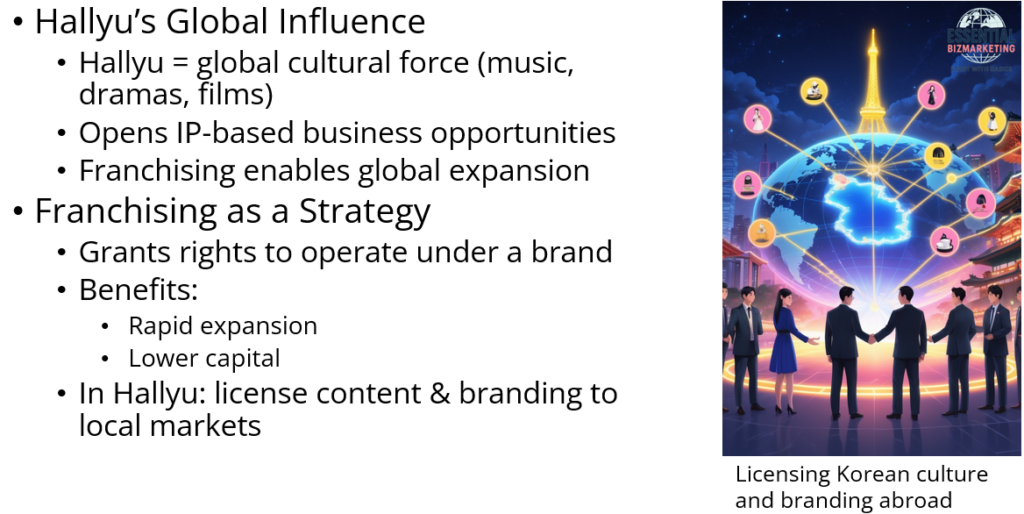Introduction: The Global Influence of Hallyu

The Korean Wave, or Hallyu, has transformed from a regional phenomenon into a global cultural force, encompassing music, television dramas, films, and more. This widespread popularity has opened avenues for leveraging intellectual property (IP) associated with Hallyu content to expand business operations internationally. By adopting franchise business models, companies can effectively utilize Hallyu IP to penetrate global markets.
Franchising Hallyu Content: A Strategic Approach
Franchising involves granting rights to third parties to operate under a brand’s name and system, allowing for rapid expansion with reduced capital investment. In the context of Hallyu, this means licensing Korean cultural content and associated branding to local entities in foreign markets. This strategy enables the replication of successful business models while adapting to local market conditions.
Case Study: CJ E&M’s Glocalization Strategy

CJ E&M, a leading Korean entertainment company, exemplifies the effective use of franchising through its “glocal” strategy—producing content that resonates both globally and locally. By collaborating with local production teams and adapting content to align with regional tastes and cultural nuances, CJ E&M has successfully introduced Korean formats to international audiences. This approach not only enhances cultural relevance but also fosters acceptance in diverse markets.
Government Initiatives Supporting Hallyu IP Expansion
Recognizing the economic potential of Hallyu, the Korean government has implemented initiatives to support the global expansion of Hallyu IP. For instance, the “2025 Hallyu IP Utilization Product Planning and Development Support Project” aims to encourage domestic enterprises to collaborate with popular Korean content IPs. This initiative seeks to stimulate licensing businesses and facilitate overseas market entry, thereby amplifying the global footprint of Hallyu content.
Challenges and Considerations in Franchising Hallyu Content

While franchising offers a pathway to international markets, it presents challenges such as maintaining brand integrity, ensuring quality control, and navigating cultural differences. Additionally, the terms of IP licensing agreements can impact the profitability and control over the content. For example, concerns have been raised about “buyout” contracts with global platforms, where creators receive a lump sum payment but relinquish future revenue rights, potentially limiting long-term benefits from successful content.
Conclusion: Maximizing Global Reach through Strategic Franchising
The franchising business model presents a viable strategy for leveraging Hallyu IP to achieve global expansion. By forming strategic partnerships, adapting to local markets, and securing supportive policies, Korean content creators and companies can enhance their international presence. Careful planning and execution are essential to navigate the complexities of franchising and to sustain the growth and influence of Hallyu worldwide.
📚 References
Kwon, S.-J. (2016). The Digital & Glocal Strategy of CJ E&M for the Growth of Hallyu. Journal of the Korea Contents Association, 16(12), 78-87. Retrieved from http://dx.doi.org/10.5392/JKCA.2016.16.12.078
Korea Creative Content Agency. (2025). 2025 Hallyu IP Utilization Product Planning and Development Support Project Announcement. Retrieved from https://m.kocca.kr/kocca/pims/view.do?category=1&intcNo=125D00091004&menuNo=204104&pageIndex=1&recptSt=&search=&searchWrd=
Yeongnam Ilbo. (2022). The Other Side of Hallyu: Concerns Over Becoming Subcontracting Bases for Global Platforms. Retrieved from https://www.yeongnam.com/web/view.php?key=20220601010000024
📁 Start exploring the Blog
📘 Or learn more About this site
🧵 Or follow along on X (Twitter)
🔎 Looking for sharp perspectives on global trade and markets?
I recommend @GONOGO_Korea as a resource I trust and regularly learn from.
